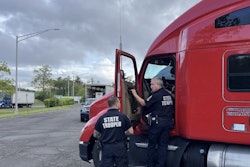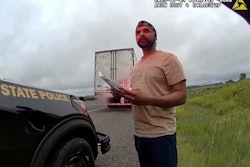Trucking news and briefs for Thursday, Sept. 4, 2025:
- The high-profile, triple-fatal crash in Florida involving a man the federal government has called an “illegal alien” yields legislation aimed at English language proficiency enforcement, and who can receive a CDL.
- A West Coast interstate has new predictive truck parking information.
- Man found guilty of arson involving mega fleet’s trailers for a second time.
New legislation would codify ELP enforcement, legal resident CDL issuance
Following the high-profile, triple-fatal illegal U-turn crash on the Florida turnpike last month involving Harjinder Singh that stoked the flames of the already-hot debate over English language proficiency requirements for truck drivers, a U.S. Senator from Florida is introducing new legislation that seeks to codify CDL issuance standards and require states to report on their efforts to uphold ELP requirements.
Announced by Sen. Ashley Moody (R-Florida), the legislation, dubbed the Safer Truckers Act (Senate Bill 2690), would add two additional requirements to the standards that are administered by the federal government to states for CDL issuance. Compliance on these additional standards would directly impact the federal funds the states receive from the Department of Transportation, Moody said.
The first requirement would ensure that CDLs are only awarded to U.S. citizens, legal permanent residents, or those who have valid work visas or authorization from U.S. Citizenship and Immigration Services. The bill would add a provision to the existing CDL standards to require that someone being issued a CDL or CLP “be a citizen or lawful permanent resident of the United States or authorized by U.S. Citizenship and Immigration Services to engage in employment in the United States that includes driving a commercial motor vehicle.”

[Related: Overdrive reporting reveals at least 60,000 non-domiciled CDLs]
The legislation would also require states to report to the federal government on their efforts to uphold the English proficiency requirements, reinforcing President Donald Trump’s executive order on ELP. The provision specifies that, by Dec. 31 each year, states “submit to the Secretary [of Transportation] a report describing the policies and actions of the State to uphold and enforce the English-language proficiency requirements for drivers of commercial motor vehicles.”
Failure to adhere to these two provisions, Moody said, would jeopardize a state’s eligibility funding and becomes the mechanism by which the federal government can force compliance.
“If you’re a commercial truck driver in America, being able to competently read the road signs in English isn’t optional… it’s the job,” Moody said. “That’s why I’m introducing the Safer Truckers Act to prevent what we saw just happen in my home state where an illegal alien, who failed his English Language Proficiency test, made a dangerous U-Turn in the middle of an interstate and killed three people. States must ensure that folks are safe on our roadways and if they don’t, they should forfeit federal funds.”
Alix Miller, president and CEO of the Florida Trucking Association, applauded the introduction of the bill. “The number one priority for the trucking industry is safety,” Miller said. “Senator Moody’s proposal will close loopholes that have allowed unauthorized and unqualified drivers to operate heavy commercial vehicles and reinforce the integrity of our licensing system; improving security on America’s highways.”
[Related: DOT threatens funding for California, Washington, New Mexico over lax ELP enforcement]
Washington state intros predictive truck parking info for I-5 rest areas
The Washington State Department of Transportation is launching a Truck Parking Information Management System to help truck drivers find convenient and safe parking at rest areas and weigh stations along the Interstate 5 corridor.
The system, viewable online here, provides truck drivers with real-time and predictive information about parking spaces available up ahead, helping plan up to four hours in advance of where to park.
WSDOT teamed with the University of Washington Star Lab to provide first-of-its-kind predictive information to truck drivers on parking availability up to four hours down the road. In addition, two vendors -- Drivewyze and ParkerTruck -- provide information for drivers either through in-cab displays in their trucks or through mobile apps on their phones. Drivers can find more details on how to access TPIMS information by visiting either vendor’s website.
The technology currently is deployed at the first nine locations listed below, with two more scheduled for completion this month. Additional locations along the I-5 corridor will be deployed through 2026. By the end of September, information will be available for truck parking at:
- Gee Creek Rest Area northbound (north of Vancouver, milepost 11)
- Gee Creek Rest Area southbound (south of Woodland, milepost 12)
- Maytown Rest Area (south of Olympia, milepost 93)
- Fort Lewis Weigh Station (near DuPont, milepost 117)
- SeaTac Weigh Station (between Fife and Federal Way, milepost 140)
- Smokey Point Rest Area southbound (south of Mount Vernon, milepost 207)
- Smokey Point Rest Area northbound (north of Marysville, milepost 207)
- Custer Rest Area northbound (north of Bellingham, milepost 267)
- Custer Rest Area southbound (south of Blaine, milepost 269)
- Toutle River Rest Area northbound (north of Castle Rock, milepost 54)
- Ridgefield Weigh Station (north of Ridgefield, milepost 15)
Truck drivers are encouraged to provide feedback on how well the program is working by completing a short online survey that will help WSDOT continue to improve the program.
Michigan man guilty of maliciously setting fires to Swift trailers
Last month, a federal jury in Arizona found Viorel Pricop, 66, of Allen Park, Michigan, guilty of three counts of arson of a vehicle or property in interstate commerce. Pricop has been in federal custody since October 2022.
According to evidence presented at an eight-day trial, Pricop maliciously set fire to three semi-truck trailers belonging to Swift Transportation as part of a larger pattern of arsons targeting Swift. Two of the arsons occurred in Willcox, Arizona, and one occurred in Holbrook, Arizona. In each of the incidents, the Swift-owned trailer was parked at or near a truck stop when Pricop set a fire on or near the trailer tires.
According to other evidence presented at trial, Pricop set at least 16 additional Swift trailers on fire in multiple states between October 2021 and September 2022. These arsons occurred at locations spanning Barstow, California, to McCalla, Alabama, with most occurring along I-10 and I-40.
Federal criminal charges associated with some of the fires were filed against Pricop in several districts and were the basis of a 2024 criminal trial in the Central District of California, where Pricop was found guilty of six arsons. He was sentenced to 10 years, 1 month of prison and ordered to pay $648,384 in restitution in that case.
An analysis of cellular data showed that a specific device -- later determined to be used by Pricop for navigation -- had connected to cell towers in the vicinity and around the times of the fires. Pricop’s cellphone was also located in the general area of all three Arizona fires. Additional items, including a gas torch, lighters, and fuel-soaked rags were found in the Pricop’s vehicle.
United States District Judge John C. Hinderaker has scheduled a Nov. 13 sentencing hearing, at which time Pricop will face a mandatory minimum sentence of five years in prison and a statutory maximum of 20 years in prison for each count.











